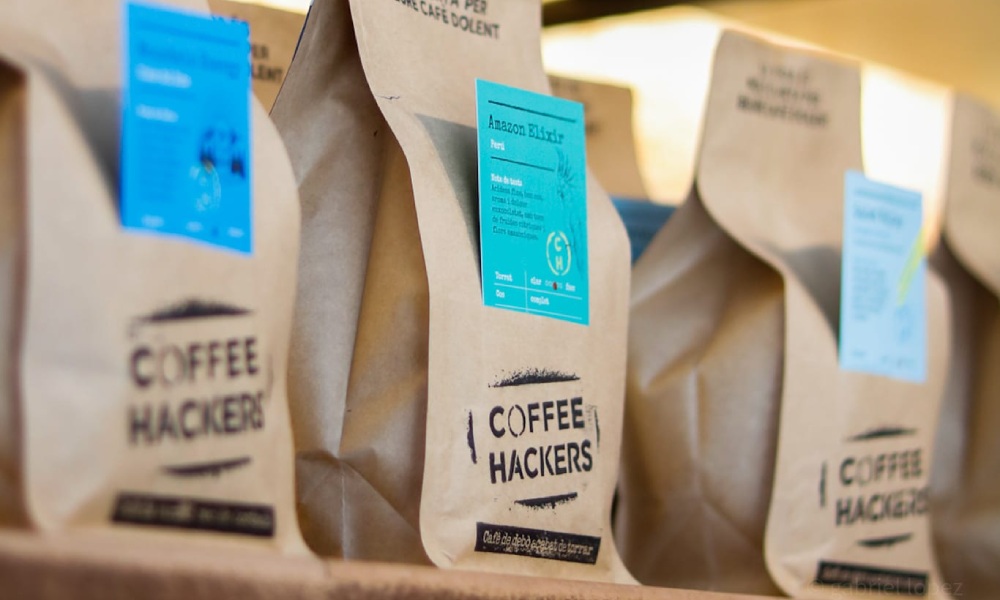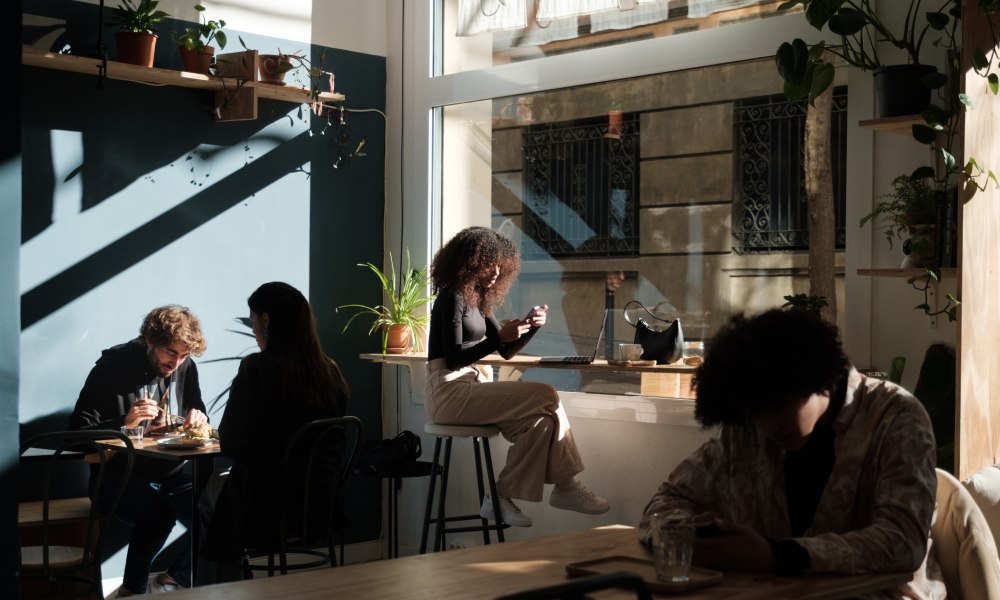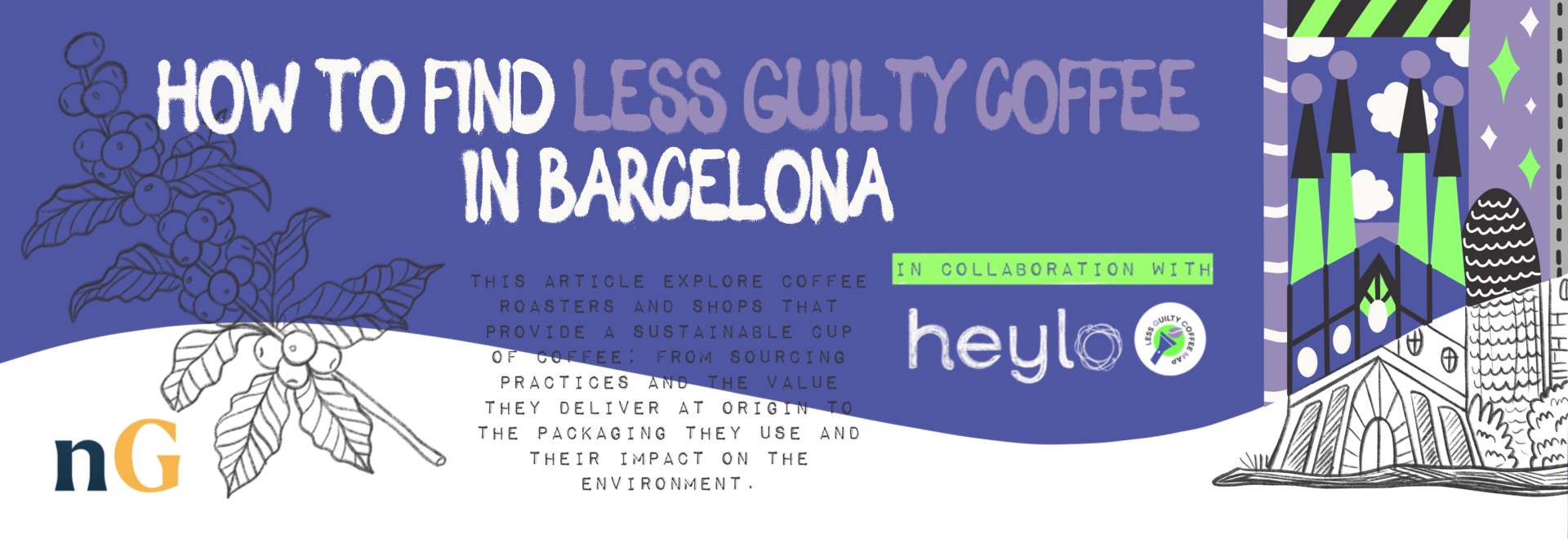How to find less guilty coffee in Barcelona
Ben Mitchell talks with Carlos Valderrama and Camille Lepetit about where to find less guilty coffee in Barcelona
In recent years, specialty coffee in Spain has taken off. As the country’s architectural and artistic hub, Barcelona has been at the centre of this growth.
This has led to the emergence of several specialty coffee brands housed in stunning buildings, with beautifully designed interiors. Additionally, an effort to provide sustainable, less guilty coffee has shaped this movement.
This article is the first in a series exploring the most ethical businesses within four major coffee-consuming cities: Barcelona, Milan, Sydney, and London.
In collaboration with Heylo Coffee, the series will explore coffee roasters and shops that provide a sustainable cup of coffee; from sourcing practices and the value they deliver at origin to the packaging they use and their impact on the environment.
These businesses can also be found on Heylo’s Less Guilty Coffee Map – which provides an interactive guide for coffee lovers to explore the most sustainable, ethical options across the world.
This project is a natural extension of Heylo’s value system. Their machines use induction heating, which not only offers superior control and greater precision over brewing parameters compared to traditional boiler systems, but also significantly reduces energy consumption. Indeed, energy efficiency was a key motivation behind the development of these machines.
So, who are these “less guilty coffee” brands?

Coffee Hackers
Having spent years learning how to farm and roast coffee, all while building relationships with people from various coffee-producing countries, Carlos Valderrama started Coffee Hackers.
This is precisely what sets Coffee Hackers apart – it’s built on a network of producers from across the world. For the past 15 years, they have been collaborating to improve the quality of the coffee they produce, generating greater value for themselves and their communities.
“I am originally from Colombia, and my family used to have land where we used to farm coffee,” Carlos says. “Colombia had a massive crisis in the 60s, and our business began to decline.”
Having left Colombia, Carlos had already established a network of producers. “Indonesia, Malawi, Congo, Kenya, Uganda, Colombia, Bolivia, Costa Rica, El Salvador, Honduras, and across Central America,” he explains. “These relationships go beyond partnerships, they are friendships.”
As he started to source coffee from elsewhere, he used this as an opportunity to exchange knowledge. Based on his years of experience farming coffee, he could give his network feedback on how they could improve their processes.
“For years it was like a volunteering deal – why don’t you increase the time of fermentation here; what type of water are you using for this; how are you recycling water in your farm; and so on.”
This built the foundations for robust trading relationships – based on knowledge-sharing and collaboration. And Carlos continues trading directly with these partners today, instilling a culture of innovation, while standing as a reliable trading partner.
“We only work with farmers directly,” he says. “This is how I started my personal journey, and I want to keep it like that.”
On the consumption end
On the consumption end, Coffee Hackers’ two Barcelona locations are committed to minimising waste and reducing their environmental impact. They use kraft paper bags for their coffee, which are hand-stamped with organic ink. This is in contrast to the mass-produced packaging often shipped from overseas, where practices around such industrial production are less regulated.
Finally, Coffee Hackers are dedicated to delivering a high-quality product. They continue to small batch roast, despite the growing demand for their coffee. This ensures greater quality control and as much value being delivered to the end consumer as possible.
Maintaining this high level of quality also plays a crucial role in guaranteeing that the producers they collaborate with receive fair compensation and maximum value from their coffee.

NEØ Coffee House
Established in 2019, NEØ was the first zero-waste and vegan coffee shop in Barcelona.
“Our project is about making people think what’s behind one cup of coffee,” says Camille Lepetit.
For NEØ, creating a business founded on the principle of zero waste came first. This founding principle is what drove them towards specialty coffee – as only then can they have more certainty over an environmentally responsible product.
“It starts with drastic decisions like choosing specialty coffee for quality and traceability – we believe that we have to know more about the product we are consuming,” says Camille.
“It is about the product itself and also what it involves in the hospitality and food industry to produce it, serve it and consume it,” says Camille. “In this way, taking time to find the best solutions for avoiding or reducing plastic and disposable packaging and materials has been a central focus for NEØ.”
A certain approach
Beyond that, Camille has a certain approach towards improving business practices and sustainability. For example, she believes collaboration is key for businesses to drive sustainability in the areas they operate.
“Working with local roasters (and partners in general) who share our values key,” she says. We’re all small and independent, so we can share our ideas, and solutions, help each other – working together to educate our customers.”
At the same time, businesses should be willing to adapt. Remaining reactive in the face of the industry’s environmental challenges is crucial for Camille, especially as prevailing ideas and thoughts can change so quickly.
“We began with this idea, and then we combined it with reality when we started the project 3 years ago – this means it’s not always perfect, but it’s real,” she says. “Sustainable solutions are constantly evolving, and people care more and more about it. We always keep learning and adjusting.”
Often, this doesn’t mean businesses must go after the most innovative and costly sustainability strategies. On the contrary, sometimes it means being aware of how your business is directly or indirectly impacting the environment, and simply putting an end to it.
“Sometimes sustainable solutions aren’t so ingenious or creative – it’s just about stopping doing something that’s harmful,” says Camille. “This is something we learned – ‘not doing’ is also a choice.”
“For example, we don’t have decaf coffee because, for us, it doesn’t make sense. The prevailing way to produce decaf is by using a lot of water, and we do that in countries that need this water for their people. At NEØ, we prefer to have a good arabica coffee, naturally low in caffeine and explain it to our customers – who are almost always okay with it.”
Less coffee, but better
And this is a central concern for NEØ – ensuring that consumers are a part of the effort towards sustainability.
“By understanding the product better, customers will want to know more about quality and sustainability,” says Camille. “We think it’s complementary – by increasing the value of the product, it also means more money for producers, to help them develop their process and take care of their local environment, and the people that live in it.”
Indeed, this ties into the brand’s overarching approach where they are striving to change the narrative on coffee – not as something we should take for granted, but something that is under threat, and that should be cherished.
“Consuming less coffee, but better – this is our vision,” says Camille.
Other less guilty coffee options
Given the incredible rise in the popularity of specialty coffee in recent years, the choice for less guilty coffee in Barcelona goes on.
Harmony Coffee Roasters seek just this: “harmony” throughout the supply chain. Whether working with importers, or directly with producers, they ensure their sourcing practices are based on values of fair trade.
“It’s a family business with high-quality coffee,” says Camille. “They put so much passion into choosing their coffees and how they roast them – being small and taking care of the details.”
Slowmov is based out of Gracia, Barcelona. They supply NEØ, as well as a number of other coffee shops in the city. The specialty coffee roaster was the first in Barcelona to implement fully compostable packaging, which they rolled out in 2018.
Syra Coffee prides itself on using “single-origin, 100% arabica, fully traceable, socially ethical, and environmentally sustainable” coffee. They are focused on sourcing from small farms, where striking up a more personal connection to the coffee they use informs many aspects of how they operate.
For the farming communities they purchase from, this connection empowers them to invest in their land and improve their farming practices to grow coffee in a more environmentally sustainable way.
Right Side Coffee understands that teamwork and transparency are at the heart of good coffee. Since 2013, Right Side have been travelling to origin to build trading relationships, and also collaborate on farming and processing techniques.
This has not only helped drive up quality among their producer network, but has also allowed them to pay up to 500% above market price in some instances.
NOMAD is perhaps the most well-known specialty coffee brand to come out of Barcelona. Since 2020, the brand has released an annual transparency report to demonstrate its commitment to producers. The 2021 edition includes the prices they paid at Free-On-Board, an explanation of the relationships between the roaster and the producers, a comparison of the prices they paid from 2021 and 2022, and information about their expenses.
Ultimately, if you take a long walk around the charming streets of Barcelona, you’ll likely stumble across some high-quality, less guilty coffee. As you marvel at Antoni Gaudí’s architectural wonders, having visited one of these coffee shops, you can take comfort in knowing you’ve made a responsible choice.







